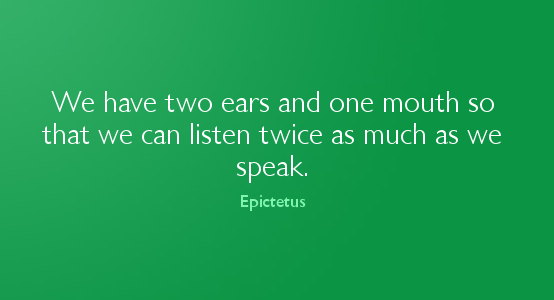By Tamara & Paul Letourneau
There is an old saying that the smartest person in the room is the person who is not talking because they are listening. The term “two ears and one mouth” means that we are supposed to listen twice as much as we talk. Have you ever given someone direction only to have them come back and have them say “what did you say” because they were not listening the first time. Or have you had the experience of talking to someone and you can see that they are looking at you, but they are not listening because they are busy formulating their next question before you are done answering the first question. As a leader do you do that? Think about it, we have all had those moments when we have been preoccupied. These are tips that if put into practice can help you be a great listening leader.
- Stop and Pay Attention When someone asks you a question. Stop and give them your full attention. It sounds simple, but we are all distracted at times when people need us to be listening. Many of us carry around multiple electronic devices every day to stay connected with our employers, customers, family and friends. That is great, but it is taking away from us being present for the conversations that are happening right in front of us. When someone asks for your attention, be present and listen carefully and engage in the conversation. We all want people to listen to us and that is what employees want in their leader – a great listener. That does not mean that you will agree with everything, but at least they know they have your full attention.
- Listen with Intention When you are in a conversation don’t interrupt and think about your rebuttal. No one likes to have someone interrupt their thoughts and interject their own before they are done. To the person trying to talk to you that is dismissive and sends the wrong message. That sends the message that you and your thoughts are more important than theirs. Instead, let the person talking to you finish their thoughts before you interject your own. That sends the message that you care about what the other person has to say.
- Ask Questions for Clarity When the person you are talking to finishes a thought, ask questions to clarify their statement to provide further understanding. Asking questions does not mean that you agree with them necessarily, but rather is shows that you are listening and you care about what they have just shared with you.
- Don’t Change the Subject There have been times when people will be engaged in an important dialogue and all of the sudden the person who should be listening becomes a “Conversational Narcissist” and will seek to turn the attention onto themselves. When you are engaged in a conversation, don’t change the subject unless the discussion is finished. If you try and change the subject of a discussion, you are showing a lack of interest in the subject or the person. It shows that whatever they are saying, you have something more important to share than they do.
- Let the Person know You Care What They Just Shared This is the important part, because this is when the conversation is about to come to a close. You are showing the person their input is important and that they are a valuable asset to the organization. You want the individual to feel that they got their message across. Even if it is a conflict or a subject that doesn’t interest you. Listening with intention shows that you care.Being a good listener takes practice. If you can incorporate these five tips and be conscientious about the people who come to you and need your help and your ears, you will gain respect of the people you lead.
_____
Tamara Letourneau is the Assistant Chief Executive Officer for the City of Costa Mesa, California and Paul Letourneau is a Manager in the retail industry.







